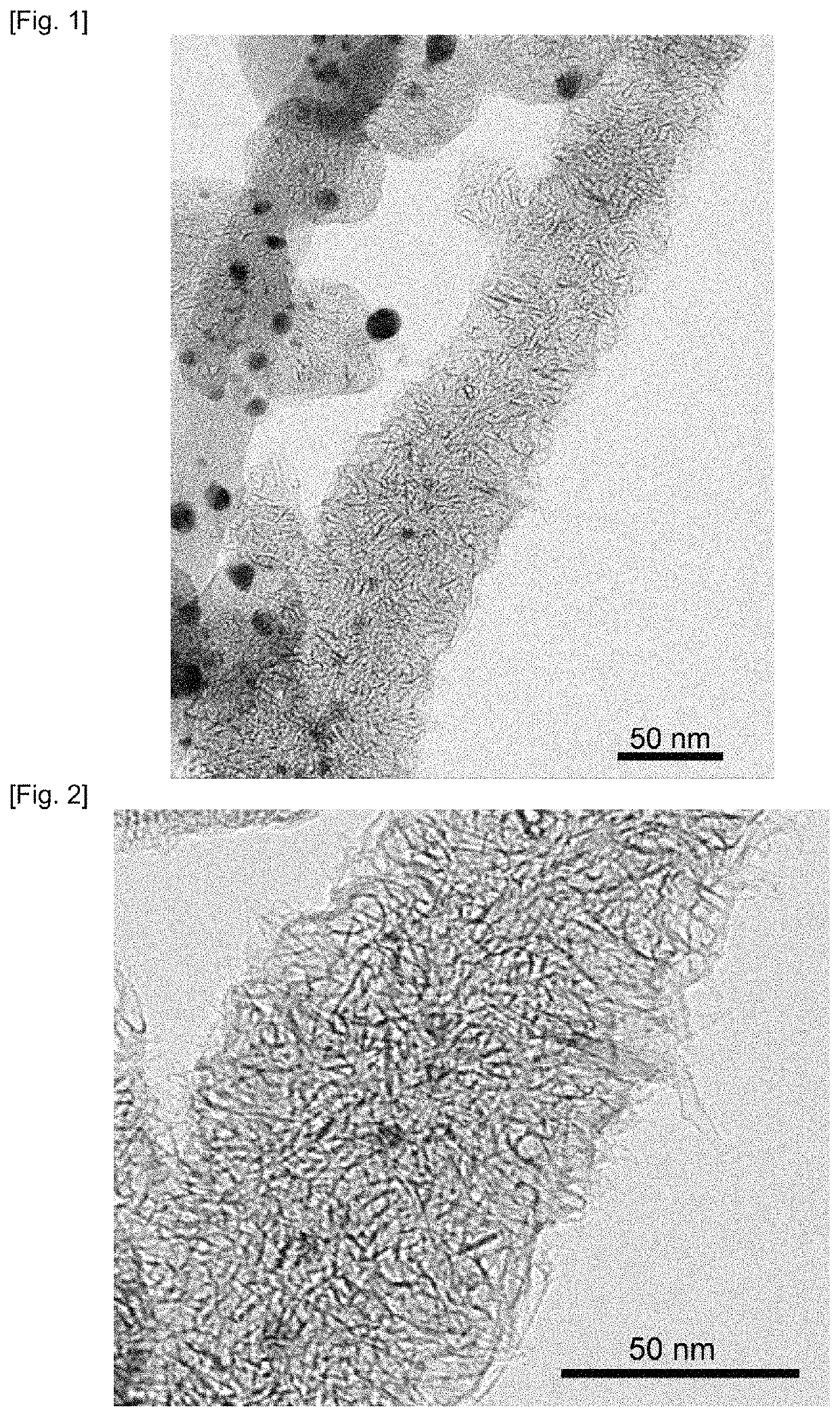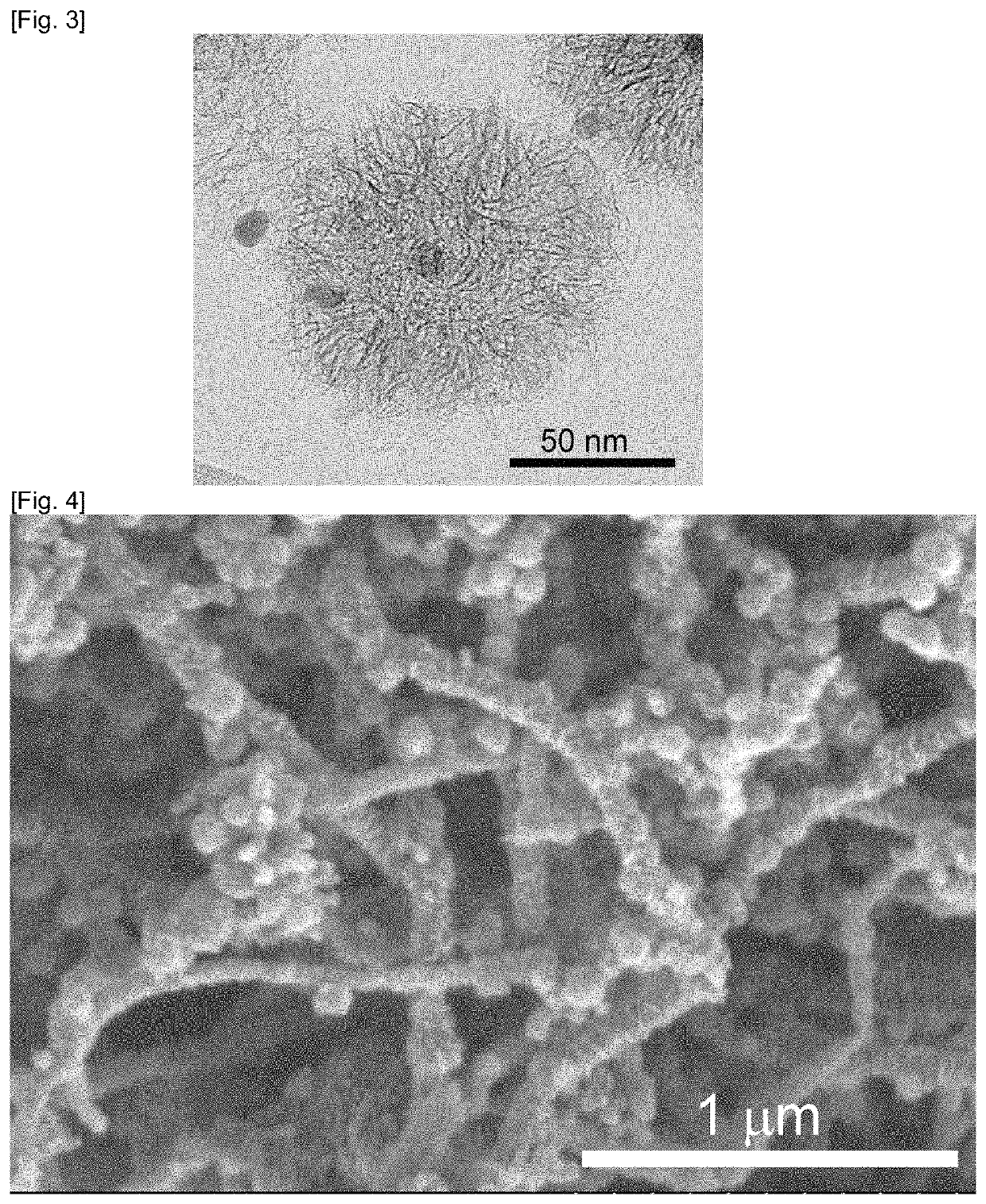Fibrous carbon nanohorn aggregate and method for producing the same
a carbon nanohorn and aggregate technology, applied in the direction of metal/metal-oxide/metal-hydroxide catalysts, cell components, physical/chemical process catalysts, etc., can solve the problem of large current load characteristic insufficient, and achieve low resistance loss in charge and discharge, good conductive paths, and less number of steps
- Summary
- Abstract
- Description
- Claims
- Application Information
AI Technical Summary
Benefits of technology
Problems solved by technology
Method used
Image
Examples
example 1
[0066]A carbon target containing 1% by mass of iron was subjected to CO2 laser ablation in a nitrogen atmosphere to thereby fabricate fibrous carbon nanohorn aggregates and globular carbon nanohorn aggregates (Sample 1). Experiment details will be described hereinafter. The graphite target containing 1% by mass of iron was rotated at 2 rpm. The energy density of the CO2 laser was 50 kW / cm2 in continuous irradiation, and the temperature of a chamber was room temperature. The gas flow volume in the chamber was regulated so as to become 10 L / min. The pressure was controlled at 933.254 to 1,266.559 hPa (700 to 950 Torr). Further, as comparative samples, there were fabricated the samples having been subjected to the laser ablation by using a carbon target containing no catalyst and in an Ar atmosphere or a nitrogen atmosphere and under the same other conditions (Ar: Sample 2, nitrogen: Sample 3).
[0067]FIG. 4 is an SEM image of Sample 1. Fibrous and globular substances were observed. The ...
example 2
[0072]Fibrous carbon nanohorn aggregates and globular carbon nanohorn aggregates were fabricated as in Sample 1 of Example 1, except for using a carbon target containing 5% by mass of iron. On TEM observation and SEM observation of the obtained product, it was observed that both of fibrous carbon nanohorn aggregates and globular carbon nanohorn aggregates were fabricated. Either of the carbon nanohorn aggregates contained seed-shaped, bud-shaped, dahlia-shaped and petal-dahlia-shaped carbon nanohorn aggregates. The ratio of the fibrous structure to the globular structure was slightly higher than Sample 1 of Example 1.
example 3
[0073]A carbon target containing 5% by mass of iron was subjected to CO2 laser ablation in a nitrogen atmosphere to thereby fabricate fibrous carbon nanohorn aggregates and globular carbon nanohorn aggregates. At this time, the target was rotated at 2 rpm. The energy density of the CO2 laser was 150 kW / cm2 in continuous irradiation, and the temperature of a chamber was room temperature. The gas flow volume in the chamber was regulated so as to become 10 L / min. The pressure was controlled at 933.254 to 1,266.559 hPa (700 to 950 Torr). On TEM observation and SEM observation of the obtained product, it was observed that both of fibrous carbon nanohorn aggregates and globular carbon nanohorn aggregates were fabricated. Either of the carbon nanohorn aggregates contained seed-shaped, bud-shaped, dahlia-shaped and petal-dahlia-shaped carbon nanohorn aggregates, but dahlia-shaped ones and petal-dahlia-shaped ones were much. The ratio of the fibrous structure to the globular structure was sl...
PUM
| Property | Measurement | Unit |
|---|---|---|
| length | aaaaa | aaaaa |
| diameter | aaaaa | aaaaa |
| length | aaaaa | aaaaa |
Abstract
Description
Claims
Application Information
 Login to View More
Login to View More - R&D
- Intellectual Property
- Life Sciences
- Materials
- Tech Scout
- Unparalleled Data Quality
- Higher Quality Content
- 60% Fewer Hallucinations
Browse by: Latest US Patents, China's latest patents, Technical Efficacy Thesaurus, Application Domain, Technology Topic, Popular Technical Reports.
© 2025 PatSnap. All rights reserved.Legal|Privacy policy|Modern Slavery Act Transparency Statement|Sitemap|About US| Contact US: help@patsnap.com



